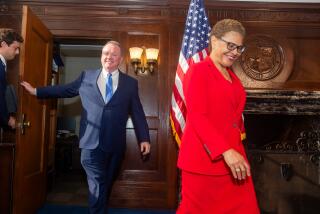A partner against crime
Compared with selecting a new Los Angeles police chief, electing the U.N.’s secretary-general -- or, for that matter, a pope -- is a streamlined exercise in political minimalism.
If you were searching for a mechanical metaphor to characterize the process, the words Rube Goldberg probably would come to mind. Yet, given the LAPD’s centrality to the city’s history -- and the outsized influence of its chiefs -- there’s something to be said for a process that opens itself to as much scrutiny and as many voices as practical in a city nearly as diverse as the U.N. General Assembly.
Mayor Antonio Villaraigosa has said that selecting William Bratton’s successor is the most important decision he will make as the city’s chief executive. He’s right. As one of the mayor’s advisors put it, “Bratton is a transforming figure” who has remade the LAPD in the spirit of reforms first suggested by the Christopher Commission and, later, incorporated into the consent degree between the city and the U.S. Department of Justice. Still, according to this advisor -- who asked not to be named -- it’s the next chief who will “have to make the reforms part of the department’s DNA.”
Like others involved in the process to whom I spoke this week, this person stressed that the next chief will have a much rougher time than Bratton -- not only because of the departing chief’s outsized personal and professional shadow, but because he must solidify and extend the reforms in the face of historic budgetary challenges.
This week, the civilian Police Commission sent Villaraigosa the names of three finalists from among the applicants for the job. All -- Assistant Chief Jim McDonnell, Deputy Chief Charlie Beck and Deputy Chief Michel Moore -- are insiders, something that is said to disappoint the mayor, who would have liked to have seen at least one name from outside, because he thinks of Los Angeles as a place that attracts the nation’s best. McDonnell, 50, is Bratton’s chief of staff; Beck, 56, is the LAPD’s chief of detectives; Moore, 49, is the Valley’s commanding officer.
The mayor, who called all three “outstanding candidates,” met with each of them at Getty House this week in conversations that included his newly appointed chief of staff, Jeff Carr, and former federal prosecutor Eileen Decker, the deputy mayor for homeland security and public safety.
In an interview Friday, Villaraigosa said that the first thing he did when he found out Bratton was leaving was to call former Secretary of State Warren Christopher to request his advice. “He not only led the Christopher Commission, but he also knows more about the history of the department and about the fight for reform than anyone else in the city,” the mayor said. “He also helped Bill Clinton vet his vice presidential candidates and came up with Al Gore. I wanted somebody who could bring that level of experience and seriousness to this process.”
With Christopher acting as a kind of chairman, Villaraigosa pulled together a group of high-powered activist civic leaders, who he said have “used their experience and historical perspective to help me create the framework for my own deliberations.” Apart from Christopher, the group includes former U.S. attorney and federal appellate judge Lourdes Baird; Stewart Kwoh, head of the Asian American Legal Center of Southern California; Connie Rice, a leading civil rights attorney; and attorney Ron Olson. The mayor also has spent nights reading the Christopher Commission report, the consent decree and the “after-action” report on the Rampart scandal.
Today, Villaraigosa will hear additional advice from Christopher, Rice and Kwoh at Getty House. (He conferred by telephone with Baird and Olson earlier in the week.) The mayor said he’ll then call all three candidates back for further interviews. By the time he’s ready to make his decision, Villaraigosa said, he will have consulted with more than 100 people.
For his part, Bratton has said he won’t formally endorse a candidate -- funny, he had views on every other civic office -- but several of those involved in the process say their conversations with the chief have left the clear impression he leans toward Beck, who also is supported by community and civil rights groups. McDonnell is said to be favored by business and civic organizations, while Moore has support from some of the City Council’s Valley members. Villaraigosa said the chief “went over the strengths and weaknesses of each candidate with me.”
Council President Eric Garcetti told me this week he expects “that any of the three candidates will be confirmed by the council.” Once Villaraigosa announces his choice, the council’s Public Safety Committee will hold public hearings. Garcetti said that if lawmakers get the mayor’s choice by Monday, a final vote will take place by the week of Nov. 17.
The city needs a chief fully committed to building on the reforms achieved so far. But a strong chief should be the City Council’s and Police Commission’s collaborator and not their lackey. There’s a difference between civilian oversight and civilian intrusion. It will be up to the council and the mayor, working with the next chief, to strike that balance. As Villaraigosa said Friday, “I want a chief who can be my partner in extending and making permanent the reforms.”
More to Read
Sign up for Essential California
The most important California stories and recommendations in your inbox every morning.
You may occasionally receive promotional content from the Los Angeles Times.










